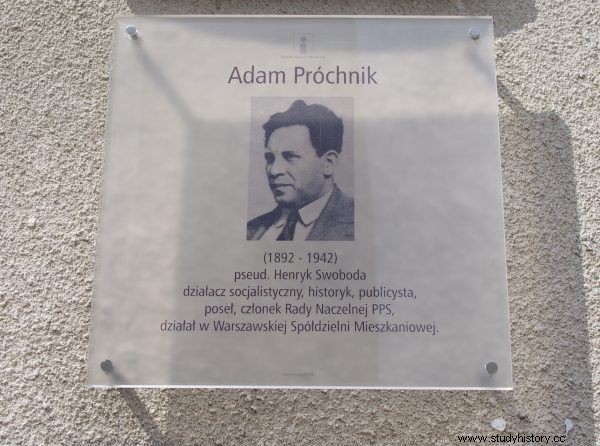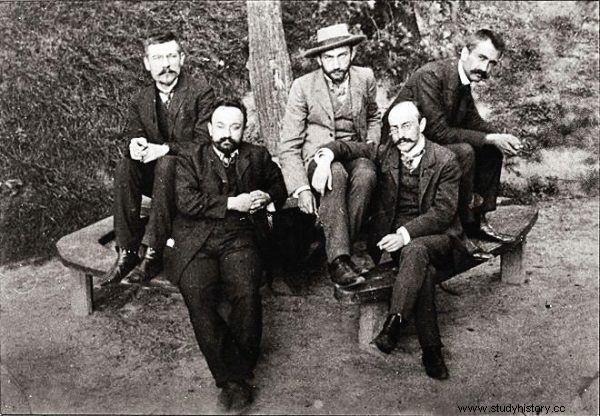An affair with a married woman and an illegitimate child? Well, it can happen to anyone. Marriage to an actress? According to the Krakow intelligentsia, Daszyński might as well have married a prostitute! Even his fellow socialists were shocked at his choice - although in their case there were slightly different considerations.
He was the first prime minister of the Second Polish Republic, but today he remains in the shadow of the other "fathers of independence". Wrong. Although he was not as picturesque a figure as Józef Piłsudski or Roman Dmowski, and his Lublin government lasted only a few days, Ignacy Daszyński's merits in creating the foundations of a free Poland cannot be overestimated.
Born on the territory of today's Ukraine, the politician was elected a representative in the Vienna State Council at the age of only 31. Moreover, he assumed the position of the chairman of the club of the Union of Social and Democratic MPs. " There are few Poles who in the Viennese Parliament, in the Austro-Hungarian Empire, reached such a high position "- evaluates the historian, professor Ludwik Malinowski. As a parliamentarian, and later as the leader of the PPS, prime minister and speaker of the Seym, Daszyński fought for the rights of workers and equal rights for all citizens.
In 1918, it was unimaginable that someone else could become the head of the first independent Polish cabinet. In the manifesto of the Provisional People's Government of the Republic of Poland, announced on November 7, the self-proclaimed prime minister postulated, inter alia, the introduction of an eight-hour working day, free, secular education, agricultural reforms and women's suffrage . Few people know, however, that the hero of the Lublin government could ... not sit in it at all. Two decades earlier, he had almost lost his political career. And it is because of one representative of the fair sex!
A fiery romance with a feminist
Interestingly, it was not about Daszyński's youthful antics with Mrs. Felicja Nossig-Próchnik. And here was also something to fault. Even today, a young politician who would have got into an affair with a married woman eleven years older, and in addition made her a child and did not give him his last name would cause quite a scandal. And what about bourgeois Lviv at the end of the 19th century!

Although it has never been officially confirmed, with his adolescent lover - Felicja Próchnik (née Nossig), Daszyński had an illegitimate son. In the photo:a commemorative plaque dedicated to Adam Próchnik in Warsaw's Żoliborz.
Iwona Kienzler, the author of over 80 publications dealing with the underestimated role of women in history, comments on this issue in her latest book, "Romances at the tops of power". As he writes:
If there were paparazzi in those days, they would probably have something to write about about the staggering actions of the hero of our story. But fortunately for Daszyński's family and himself, the then press had much more important topics than the private life of even the most famous actors of the political scene of the time .
Ignacy's relationship with Felicja went virtually unnoticed. Even among Daszyński's closest associates, it did not arouse much emotion. After all, Mrs. Próchnik was a militant feminist, loudly advocating for the rights of the fair sex. In this respect, she was close to the views of the flesh and blood socialists in which the future prime minister was involved.
Besides, even herself was not particularly concerned about the prospect of single motherhood . In 1894, with a child in her arms and her divorce, she left for studies in Switzerland, and then further - to Paris. She made a living by translations and journalistic fees.
Miss from a bad enough house
Meanwhile, Daszyński quickly located his feelings elsewhere. In 1897, he got a warm post as an MP, thanks to which he repaired his dilapidated finances, and decided that it was time to settle down. He has been lonely for some time now - in his own words, "she was heavy on him like a dog". His decision to start a family, therefore, did not surprise anyone. The real shock was only… the choice of a candidate for a wife.

On the threshold of the twentieth century, in conservative, bourgeois Krakow (where Daszyński lived at that time), certain things simply did not fall out for a woman. One of them was working in the theater. The poet, Maria Konopnicka, on the news that her daughter wanted to devote her life to a stage career, stated that the actresses are women renouncing respect, living in a world of "filth, intrigue, idiocy and misery - both types - moral and material".
Many shared her views. "In those days, women professionally performing on stage, even if they played in Shakespearean plays, to put it mildly, did not have a very good reputation" - emphasizes Iwona Kienzler in the book "Romances at the top of power". The most ardent opponents of the theater even compared the actresses to employees of brothels .
Therefore, deciding to establish a relationship with Maria Waleria Paszkowska, who earned her living at the Municipal Theater in Krakow, Daszyński risked a lot. Although he was a socialist with strongly liberal (as for those times) views, however - after all - he represented the Krakow district in Vienna. Marriage with the actress could offend his voters and ruin his chances of a political career.

Daszyński's decision to marry the actress shocked not only conservative Cracovians, but also fellow socialists (pictured:PPS activists:Bolesław Czarkowski, Aleksander Sulkiewicz, Bolesław Jędrzejowski, Józef Kwiatek and Walery Sławek).
Interestingly, the news of the engagement of Maria and Ignacy also caused a scandal in the family of the future bride. Sister Faustina and brother Tadeusz severed all relations with her, and the other sister, Anna, lost her fiancé because of Marysia's marriage plans and - horrifyingly - a socialist activist. Aware of the reluctance of the environment, the lovers decided to escape as far as possible from conservative Krakow and finally got married in Vienna.
Opposites attract?
Daszyński's relationship with Miss Paszkowska shocked not only the Krakow intelligentsia. He was a surprise, and a rather unpleasant one, also for his party mates. Everyone expected that if Ignatius took on the yoke of marriage, a woman with an open mind and modern views would become the chosen one of his heart. Naturally - like him - a socialist.
Maria was the opposite of all this:she came from impoverished nobility, was brought up in accordance with traditional values and was deeply religious, while Daszyński prided himself on his atheism. "She did not share his socialist views, doubtful that she had any idea what the socialist movement was about ”Describes it by Kienzler.
The marriage of two people with such extremely different worldviews turned out to be a mill for opponents of the young, ambitious politician. Soon after the Daszyński wedding, they began to spread rumors that Ignacy, under the influence of his wife , had converted to the bosom of the Church and therefore planned to submit a parliamentary mandate and withdraw from the political scene.

Daszyński was close friends with Piłsudski for many years. He was one of the few people with whom the future Marshal switched to "you".
His voters were probably confused to say the least. The more so because Daszyński was outside the country and could not personally deny these slander. He decided to defend himself in a different way. He published a letter in the "Naprzód" magazine, of which he had previously been the editor-in-chief. In it, he strongly assured his supporters that he had no intention of giving up politics.
"Goldmouth Ignac"
Fortunately for Daszyński, everything ended well, although love almost stood in the way of his dizzying (as the future showed) career. Remarkable charisma and extraordinary oratorical talent guaranteed him a place in the Austrian Council of State for 21 years. His passionate speeches have gone down in history in which he criticized the political situation, the state of the economy, inept actions of the administration and social injustice prevailing in Galicia.
"His speeches in the Viennese parliament were the events of the day, on Galician soil he soon became the idol of workers, peasants, youth, and women" - described Daszyński's biographer Józef Feldman. No wonder that friends jokingly called him "the golden-mouthed Ignat" .
When it came to what, Daszyński turned out to be a perfect candidate for the prime minister of the first independent government established in Poland. Not only was he able to reconcile independence activities with socialist views, but he was also close friends with Piłsudski. He was one of the few politicians with whom the future Marshal switched to "you". And after just five days in office, he handed over power to him with ease. His time was yet to come. Anyway, as the historian Dr. Janusz Osica said:“Daszyński knew how to lose. He was losing stylishly and beautifully, what we Poles love the most ”.
Read also what the creation of the Lublin government really looked like. And what role did women play in these events
Bibliography:
- I. Daszyński, On the state, democracy and parliamentarism (compiled by M. Śliwa), Wydawnictwo Sejmowe 1997.
- I. Kienzler, Romances at the Top of Power , Bellona 2018.
- Ignacy Daszyński. The erroneous knight of Polish parliamentarism , Polish Radio [access:6 November 2018].
- W. Najdus, Ignacy Daszyński 1866–1936 . Reader 1988.
- T. Targański, A dream about a sword and a hammer. Ignacy Daszyński:the great, forgotten Pole , "Polityka" [access:6 November 2018].
Buy the book cheaper at the Publisher's bookstore:

